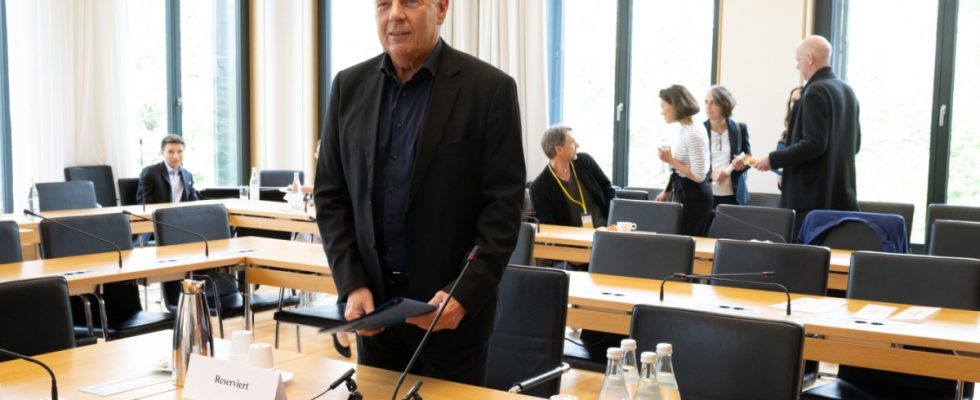It was the first time in his life that Mayor Dieter Reiter (SPD) was heard as a witness. After the almost two-hour meeting of the committee of inquiry into the construction of the second S-Bahn trunk line in the Bavarian state parliament, he still felt “relaxed”. After all, he was “not summoned as a suspect”. But as a very special witness, namely as someone who was not supposed to explain everything he knew, but why he actually never knew anything.
He did this extensively with the mixture of flippantness and seriousness that is often characteristic of him. On September 29, 2022, he found out that the second S-Bahn tunnel under the city center should not be completed in 2028, as announced, but only in 2035 or even 2037, said Reiter. The same applies to the costs, which are expected to double from 3.85 billion. Communication with the Free State as the client and Deutsche Bahn as the executing company went “rather poorly”. “What I or the city knew was manageable.”
On September 29, the Free State and the railways officially announced the delay and the explosion in costs in a press conference. The mayor of Munich can still get upset about this today. In the committee of inquiry, Reiter called the delay “a slap in the face of the traffic turnaround” and a “mega annoyance” for the people of Munich.
Inquiries at the working level about costs and schedule were unsuccessful at both the railway and the Free State. That was already the case in autumn 2020, when the media first reported a possible delay from 2028 to 2032. And that didn’t improve afterwards. A top-level discussion with the company, the federal government and the Free State had been scheduled several times, but never came about for various reasons. “I didn’t get enough information from either side.”
Discussions about the main route had been canceled again and again
The mayor was good as a witness for failures in communication on the part of the railways and the Free State, but as a hard witness against the main suspect, he did not fulfill the hopes of the opposition in the state parliament. She had set up the investigative committee to prove that Prime Minister Markus Söder (CSU) had intentionally withheld or suppressed public information. There may be numerous indications of this in the files, but Reiter did not provide any new fodder with his statement.
As early as October 2020 there were press reports that the completion of the second main line would be delayed from 2028 to 2032. Reiter also registered this and asked the client of the building, the Free State, about it. On October 13th he was invited to a regular route summit. Federal Minister of Transport Andreas Scheuer (CSU) should come, according to Reiter, the board members Richard Lutz and Roland Pofalla, and of course Prime Minister Söder and his then Minister of Transport Kerstin Schreyer. But shortly before the meeting on October 23, the appointment was canceled by the State Chancellery.
As a result, there were to be several talks about the main route in different compositions, but they were canceled again and again, partly because of the pandemic. Reiter was asked why he didn’t ask directly when he met Prime Minister Söder. At photo ops like this, people tend to talk about things that are edifying, said Reiter. If there are dozens of photographers and cameramen standing around, just hold out the Pumuckl to them, like this spring to commemorate Master Eder, alias Gustl Bayrhammer. You don’t explain factual questions there.
The city association of the Greens has often noticed that Reiter exudes a good mood at Söder appointments rather than showing political bite against the CSU and its prime minister and party leader. He would expect more commitment, especially on the main route, says Green City Councilor Joel Keilhauer after questioning Reiter.
Less Sunday speeches and more action for the traffic turnaround
The Greens will have noted that the investigative committee also discussed a document in which the then Minister of Transport, Hans Reichhart, wrote about a public peace deal between the town hall and the state chancellery. It was about the first delay in construction from 2026 to 2028, for which the Free State was responsible for rescheduling and the city for requests to connect the new U9 underground line. Reiter denied such a deal, but said it made no sense to point fingers at each other if both were to blame.
Against Söder and also his current Minister of Transport Christian Bernreiter, Reiter could not get much out of it, only that he would have expected the Free State to monitor such a large project better. For this he sent a greeting to a party friend, to whom he recommended less Sunday speeches and more action for the traffic turnaround. During his time as Hamburg mayor, Olaf Scholz demanded eight billion euros a year from the federal government for local public transport, and with him as chancellor the federal government would be clearly below that, said Reiter.

